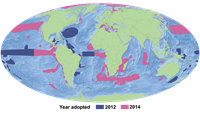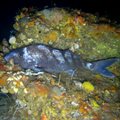|
Ecologically or biologically significant marine areas (EBSAs) are geographically or oceanographically discrete areas that provide important services to one or more species/populations of an ecosystem or to the ecosystem as a whole, compared to other surrounding areas or areas of similar ecological characteristics, or otherwise meet at least one of the 7 EBSA criteria. These sites need to be protected with conservation or other management measures to help stop the rapid loss of marine biodiversity in the ocean, in both benthic and pelagic habitats. The intent is for EBSAs to help countries to achieve the  global Aichi Biodiversity Targets for 2020 (specifically Target 11), and to identify priority areas for protection in areas beyond national jurisdiction. Currently, there are 279 EBSAs worldwide. Learn more about EBSAs global Aichi Biodiversity Targets for 2020 (specifically Target 11), and to identify priority areas for protection in areas beyond national jurisdiction. Currently, there are 279 EBSAs worldwide. Learn more about EBSAs
|

EBSAs in the BCLME were identified at a regional meeting in 2013 and adopted by the Convention on Biological Diversity at the 12th Convention of the Parties in 2014 (view full EBSA history). The next steps are to implement improved conservation and protection measures within these sites. To achieve this, the Benguela Current Commission (BCC) and its member states, in cooperation with GIZ on behalf of the German government, are embarking on a regional Marine Spatial Management and Governance Programme (MARISMA; 2014-2020). The intent is to refine existing EBSAs and identify relevant new ones, and incorporate these in a regional Marine Spatial Plan to achieve sustainable ocean use in the Benguela Current. Read more about MARISMA or watch a 5 min video to learn more about marine spatial planning (video available in: Afrikaans, English, isiXhosa, isiZulu, Português).
|